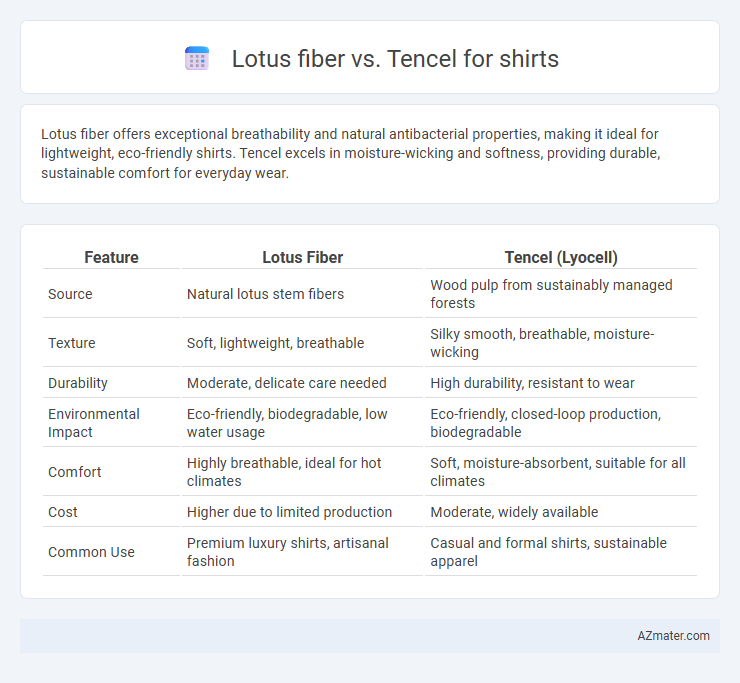Lotus fiber offers exceptional breathability and natural antibacterial properties, making it ideal for lightweight, eco-friendly shirts. Tencel excels in moisture-wicking and softness, providing durable, sustainable comfort for everyday wear.
Table of Comparison
| Feature | Lotus Fiber | Tencel (Lyocell) |
|---|---|---|
| Source | Natural lotus stem fibers | Wood pulp from sustainably managed forests |
| Texture | Soft, lightweight, breathable | Silky smooth, breathable, moisture-wicking |
| Durability | Moderate, delicate care needed | High durability, resistant to wear |
| Environmental Impact | Eco-friendly, biodegradable, low water usage | Eco-friendly, closed-loop production, biodegradable |
| Comfort | Highly breathable, ideal for hot climates | Soft, moisture-absorbent, suitable for all climates |
| Cost | Higher due to limited production | Moderate, widely available |
| Common Use | Premium luxury shirts, artisanal fashion | Casual and formal shirts, sustainable apparel |
Introduction to Lotus Fiber and Tencel
Lotus fiber, derived from the stems of the lotus plant, is a rare and eco-friendly material known for its natural sheen, breathability, and antibacterial properties, making it ideal for premium shirts. Tencel, a sustainable fabric made from wood pulp using a closed-loop process, offers exceptional softness, moisture-wicking capabilities, and durability, often favored for comfortable and environmentally conscious clothing. Both fibers emphasize sustainability but differ in texture and source, with lotus fiber providing a unique artisanal touch compared to the modern technological innovation of Tencel.
Origins and Production Processes
Lotus fiber is derived from the lotus plant's stem, primarily harvested in regions like Myanmar and India through a painstaking hand-extraction process that ensures sustainable and eco-friendly production. Tencel, known as lyocell, is produced from sustainably sourced eucalyptus wood pulp using a closed-loop solvent spinning technology that minimizes environmental impact while providing soft, breathable fabric ideal for shirts. Both fibers emphasize sustainability, but Lotus fiber's artisanal extraction contrasts with Tencel's industrial, eco-conscious manufacturing techniques.
Eco-Friendliness: Sustainability Comparison
Lotus fiber is derived from the lotus plant, showcasing remarkable sustainability due to its biodegradable nature and minimal water usage during cultivation, making it a highly eco-friendly textile choice for shirts. Tencel, produced from sustainably sourced wood pulp through a closed-loop process, significantly reduces environmental impact by recycling solvents and using less water and energy compared to traditional fibers. Both fibers offer environmentally responsible options, with Lotus fiber emphasizing biodiversity preservation and Tencel focusing on efficient resource management and reduced chemical use.
Fabric Feel: Softness and Comfort
Lotus fiber offers a unique, natural softness with a slightly textured feel, providing breathable comfort ideal for warm climates, while Tencel stands out for its smooth, silky texture that drapes effortlessly and feels exceptionally gentle against the skin. Both fabrics excel in moisture-wicking and breathability, but Tencel's superior softness enhances all-day comfort, making it a preferred choice for sensitive skin. Lotus fiber, derived from lotus stems, delivers eco-friendly durability combined with a subtly crisp feel, balancing softness with structure in shirt fabrics.
Breathability and Moisture Management
Lotus fiber offers exceptional breathability due to its natural hollow structure, allowing air to circulate and keep the skin cool and dry. Tencel, made from sustainably sourced eucalyptus wood pulp, features superior moisture-wicking properties that efficiently absorb and release sweat, enhancing comfort during physical activity. Both fibers provide effective moisture management, but Lotus fiber excels in natural ventilation while Tencel is renowned for its smooth texture and moisture absorption capacity.
Durability and Longevity
Lotus fiber offers exceptional durability due to its strong natural filaments, making it ideal for long-lasting shirts that maintain structural integrity over time. Tencel, derived from sustainably sourced eucalyptus, provides moderate durability with enhanced softness and moisture-wicking properties but may wear faster under heavy use compared to lotus fiber. Shirts made from lotus fiber resist abrasion and pilling more effectively, ensuring longevity in high-stress areas like collars and cuffs.
Allergenicity and Skin-Friendliness
Lotus fiber shirts exhibit excellent hypoallergenic properties, making them ideal for sensitive skin due to the natural antibacterial compounds in the fiber. Tencel, made from sustainably sourced eucalyptus wood pulp, is renowned for its moisture-wicking ability and smooth texture that reduces skin irritation and allergens. Both fibers are highly skin-friendly, but lotus fiber offers superior breathability and antimicrobial benefits that minimize allergenic reactions.
Color and Dye Retention
Lotus fiber offers natural color vibrancy with excellent dye absorption due to its porous structure, resulting in deep, rich hues that remain stable over time. Tencel, known for its smooth, cellulose-based surface, allows uniform dye penetration, producing bright colors but may exhibit slight fading after multiple washes. Both fibers support eco-friendly dyeing processes, but Lotus fiber generally provides superior color intensity and longer-lasting dye retention in shirts.
Cost and Market Availability
Lotus fiber, derived from lotus stems, is rare and costly due to its labor-intensive extraction process, limiting its market availability primarily to niche luxury apparel. Tencel, a brand of lyocell fiber made from sustainably sourced wood pulp, offers a more affordable and widely accessible alternative with mass production and established global distribution. The cost-efficiency and scalability of Tencel make it the preferred choice for mainstream shirt manufacturing, while lotus fiber remains a premium option for exclusive, eco-friendly products.
Conclusion: Choosing the Right Shirt Material
Lotus fiber offers exceptional breathability and natural antibacterial properties, making it ideal for eco-conscious consumers seeking sustainable and hypoallergenic shirts. Tencel, derived from eucalyptus wood, provides superior moisture-wicking, softness, and durability, perfect for comfort-focused everyday wear. Selecting between Lotus fiber and Tencel ultimately depends on prioritizing sustainability and natural texture versus performance and comfort in shirt material.

Infographic: Lotus fiber vs Tencel for Shirt
 azmater.com
azmater.com